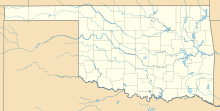Battle of Washita River
| Battle of Washita River | |||||||
|---|---|---|---|---|---|---|---|
| Part of the Indian Wars | |||||||
 Battle of Washita from Harper's Weekly, December 19, 1868 |
|||||||
|
|||||||
| Belligerents | |||||||
|
|
Cheyenne | ||||||
| Commanders and leaders | |||||||
| George A. Custer | Black Kettle† | ||||||
| Strength | |||||||
| 574 soldiers | 150 warriors (est.); total camp population 250 (est.) | ||||||
| Casualties and losses | |||||||
| 21 killed and 13 wounded |
Range of military and civilian scout estimates: * 16 to 140+ men killed * "some" to 75 women and children killed Range of Cheyenne estimates: * 11 to 18 men killed * 17 to "many" women and children killed Total: *Estimates range from 13 to 150 total killed; 53 women and children captured See discussion below for further information and sources. |
||||||
|
|
|||||||
The Battle of Washita River (also called Battle of the Washita or the Washita Massacre) occurred on November 27, 1868 when Lt. Col. George Armstrong Custer’s 7th U.S. Cavalry attacked Black Kettle’s Southern Cheyenne camp on the Washita River (near present-day Cheyenne, Oklahoma), part of a major winter encampment of numerous Native American tribal bands.
After the Southern Cheyenne and Arapaho signed the Medicine Lodge Treaty, they were required to move south from present-day Kansas and Colorado to a new reservation in Indian Territory (modern Oklahoma). This forced them to give up their traditional territory for one with little arable land and away from buffalo, their main source of meat and a center of their culture. Months of fragile peace survived raids between warring Kaw Indians and Southern Cheyennes.
But in summer 1868, war parties of Southern Cheyenne and allied Arapaho, Kiowa, Comanche, Northern Cheyenne, Brulé, Oglala, and Pawnee warriors attacked white settlements in western Kansas, southeast Colorado, and northwest Texas. Among these raids were those along the Solomon and Saline rivers in Kansas, which began August 10, 1868. The warriors killed at least 15 white settlers, wounded others, and were reported to have raped some women, as well as taking others captive to be adopted into their tribes.
"The total of losses from September 12, 1868, to February 9, 1869, exclusive of casualties incident to military operations, was 158 men murdered, sixteen wounded and forty-one scalped. Three scouts were killed, fourteen women outraged, one man was captured, four women and twenty-four children were carried off. Nearly all of these losses occurred in what we then called western Kansas, although the Saline, Solomon and Republican do not seem so very far west now".
...
Wikipedia

